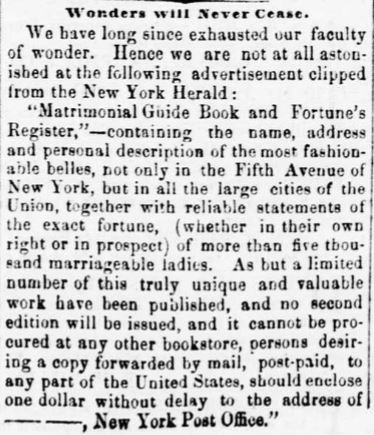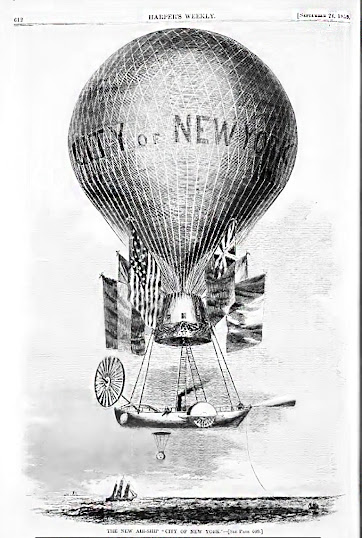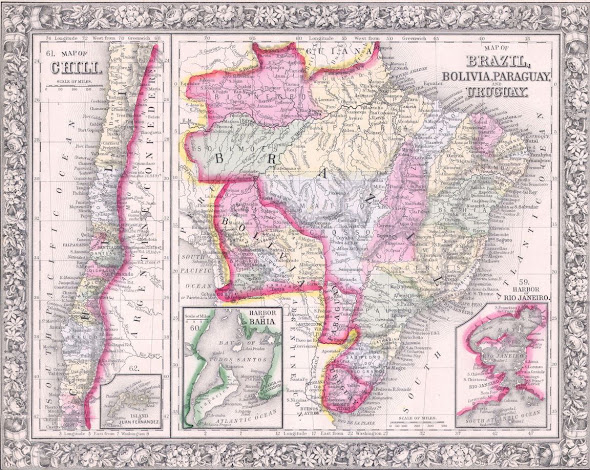How Do I Find This Weird Stuff???
The 5,000 Richest Girls in the US
I am occasionally asked, “how do you find all the strange stuff in your blog?”
The answer is “I stumble onto it.” Researching one thing leads to reading about something else just as fascinating or unknown as what I am originally looking for.
For example: I was looking for stories about the election of Nathaniel Banks, Jr. as Speaker of the US House of the 34th Congress February 2, 1856. Banks was elected after the House had voted 133 times! over a period stretching from December 1855 to February 2, 1856
I found a detailed account of the Speaker election on page 1 of the February 3, 1856 The New York Herald --8 pages- two cents a copy
Here is what was on each page:
PAGE ONE
Story one is about the election
of Nathaniel Banks Jr, from the Massachusetts 7th district as new Speaker of the House. The headline reads “Black Republicans Drunk
With Joy.” (The term “Black Republicans”
was derisively used by all who opposed abolitionists. Certainly, there were no
Black voters but the Republican Party stood for restricting both the further
spread of slavery and some supported its eventual gradual abolition.) After two
months and a 133 votes saga, Banks was finally elected as a compromise
candidate. The only way the House could elect a Speaker was by doing away with
the rule requiring a majority of votes and adopting a rule that a plurality of
votes was sufficient. Banks got 103 votes; Aiken 100 votes; scattered minor
candidates; 11 votes. Banks’ brief acceptance speech was printed after the
story.
Story two is from Washington DC, dated Feb. 1, 1856. The US Senate debated America’s response to
what it viewed as a violation of a treaty with England, requiring the English
to remove newly founded colonies in Central America. Sen. Seward made a speech
stating that if England could not rigorously follow the treaty obligations the US
should teach England to honor treaty obligations. “This lesson could not be taught too soon,” removing
the colonies by force.
General Cass,
senator from Michigan, followed Seward’s remarks stating he knew the British Prime
Minister well. Lord Palmerston was a monarchist and “a rabid hater of American
institutions; although liberal in many respects, on all subjects touching our government he is stubborn as a mule.”
Story
three reports the US mail
steamship Black Warrior has taken Mlle. Rachel, an international super star of
the period, to Havana and from there she’ll return to France. The same story
reports the sugar market in Cuba is smaller than usual and that American tourists are all over the place. The governor of Cuba has finally issued an edict saying Cubans can no longer accept American coins.
Story
four. A judge hears testimony on whether New York’s
Central Park should be constructed. The
city attorney recommends against it, saying it provides too much entertainment
for the upper classes with its riding and carriage paths and the rest of the
park would only draw a lower sort of crowd and soon the park would surrounded by “German lager bier saloons.” The Park Committee’s lawyer, Mr. Dillon,
assures the judge there is plenty of space planned for anybody not riding or
driving a carriage. As for the saloons, Mr. Dillion says that might not be a
bad thing as it would have German and Americans mingling and getting to know
each better.
Story five
a letter to the editor
from the NY City superintendent of roads. A previous Herald article claimed he
and his staff demanded bribes from workers. The
superintendent claims there are no bribes paid to himself or anyone else in his
department.
Story six is a bizarre legal action brought
against the chief of police of New York City. An early victim of “birtherism?”
It is claimed he cannot be police chief since he is not American born. Sound proof is provided that he is indeed
American born and anyway, the Chief's lawyer asks, what does foreign birth have to do with being police chief?
Story seven is about the cold weather stretching from
the Midwest all the way south to Vicksburg, MS.
Ice is ten inches thick at Memphis and people are busy harvesting it for
the summer. A Michigan correspondent writes they have enjoyed sleigh riding for
several weeks now.
Story eight is a lurid story of a murder trial.
Story nine takes a column and a
half and continues to fill up the entire second page and column on the third
page. General Cass, Senator from Michigan, gives a speech in the Senate on the
possibility of war with England. Cass
says the US has drifted into this course of confronting the English in Central
America. America should change course, Cass says, but the British have not. So
Cass declares if the US alters course to avoid war “then it would be but
temporary escape and we should find that while we had lost character, we had
not gained the poor recompense of safety exchanged for dishonor.”
PAGE TWO
is entirely taken
up with Sen. Cass’ speech
PAGE THREE
is yet more of Sen. Cass’ speech;
A feature article on the British judicial system follows.
Then, a gruesome story of a railroad accident.
Filling in the rest of
the page is a story from Illinois about two men eloping with each other’s wives. It's discovered that each man is a bigamist, already married to other women in New York.
PAGE FOUR
A summary of the meeting of the Anti-Slavery Society in Boston;
Doings of the New York legislature;
Feature story on the American judicial system;
A list of who is performing what when at various theaters;
An editorial on the possible war with Britain.
The page wraps up with a report from the city sanitation
department of the number of deaths in the city the prior week, divided by
gender, age, and cause.
PAGE FIVE
is all
advertising
PAGE SIX
An amusing and condescending story about the Nebraska legislature.
Then, a horrific story
about slave catchers breaking into a Cincinnati home to snatch a family of
runaways. During the raid, the Black mother slits her son’s throat so he will
never suffer slavery.
PAGE SEVEN
is all advertising
PAGE EIGHT
A very detailed account of the Anti-Slavery Society meeting in Boston;
In St. Louis, “Old Squirt,” the newly acquired steam driven fire pump is tried out against a team of fire fighters to see if the machine is worth buying. "Old Squirt" loses, but the harsh weather is blamed.
It is so cold a German in St. Louis has built a bridge out onto the ice and charges 50 cents a person to cross it.
An actor named Joseph Fried dies in Boston;
A 108 year old man once enslaved by George Washington’s nephew dies.
Maritime news--ships arriving; ships departed; ships missing and overdue; ships wrecked- where and carrying what cargo; ships spoken (seen at sea by another ship at some point.)
Maritime news is not only important for commerce, many of any newspaper's stories begin with lines such as "from letters and newspapers delivered February 1 by the Royal Mail Steamship XYZ"



.jpg)




Comments
Post a Comment